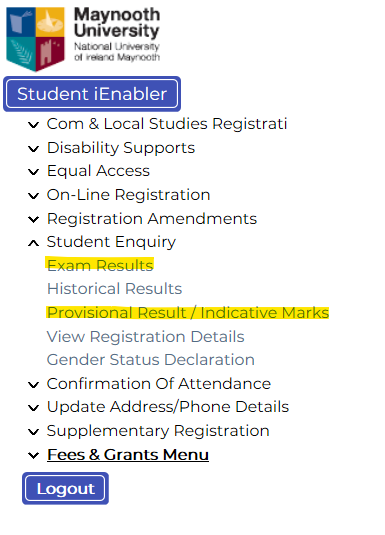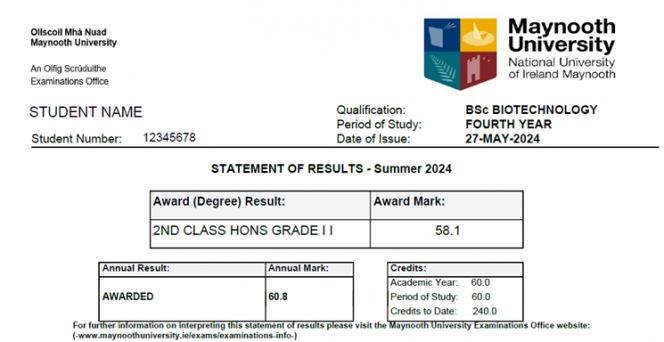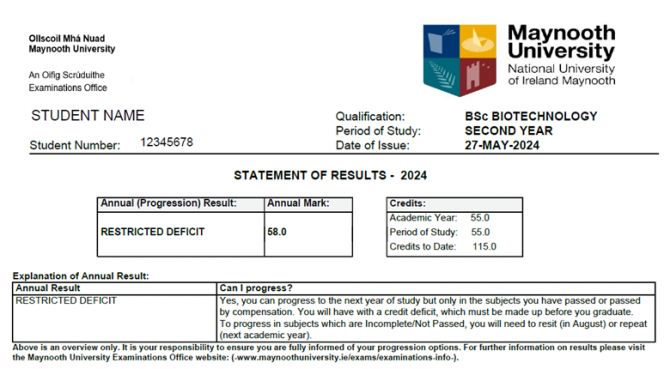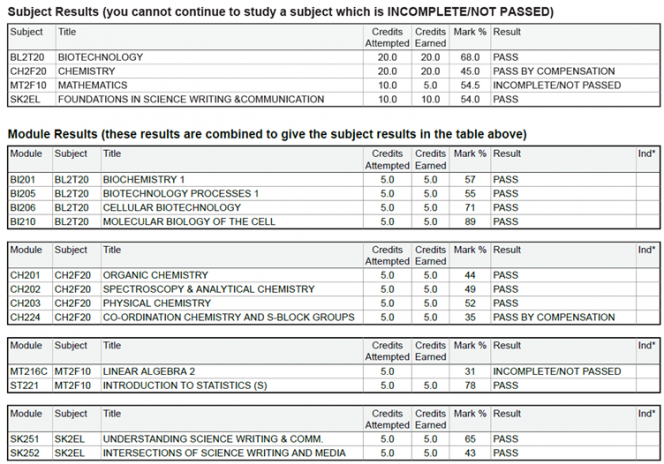Maynooth University Examinations and Assessment Office
ToggleMarks and Standards (2016)
Marks and Standards (2016) regulations apply to all undergraduate and postgraduate students in 2018-19 and beyond.
Marks and Standards should be read in conjunction with the Module Information, the Programme Specification and the Departmental Handbook for details of specific requirements of modules, entry criteria for modules with restricted entry, and deadlines and penalties.
Programme, subject and module details can be viewed via Course Finder
Departmental Handbook is available from your Department.
When will my results be available?
| If you began your studies: | If you completed your studies: | Final Results available: |
| September | May | June/July |
| September | August | September |
| September | October | November |
If you registered and took any Autumn Supplemental/Resit assessments (exams or CA) in August your results should be available in September.
Click here for exact release dates for the current year for final results and also provisional/indicative marks.
How can I see my results?
Your results will be released online and you can view them by logging on the Student Web
Accessing your results online
First log in to student web

Select Student Enquiry and then Exam Results
If you wish to view your provisional results, select Student Enquiry and then Provisional Result / Indicative Marks

Reading your Statement of Results

| Award (Degree) Result | This box only appears if you are in the final year of your course and may be awarded a degree. It shows the award classification – in this example “2nd Class Hons Grade 1” It also shows the award mark in this case 66.7%. Note that the award (degree) mark is based on a combination of annual marks – in this example a student in a four year degree will have an award mark based 70% on the fourth year mark, 20% on the third year mark and 10% on the second year mark. |

| Annual (Progression) Result |
This box shows the overall annual result and mark for this period of study. The annual mark includes only modules in which credits were earned. For students who are not in their final year a box which includes an explanation of their Annual result will also be included. |
| Credits Academic Year |
This is the total of credits earned (i.e. passed) this academic year. |
| Credits Period of Study |
This is the total credits earned in this period of study. It will be the same as the figure above except where you repeated a period of study, in which case it shows the cumulative credits from all attempts at the period. |
| Credits to date | Shows the cumulative credits the student has earned in this qualification. |

The lower part of the statement of results shows your subject results followed by your module results for this academic year. For students repeating a period of study, the statement shows only the modules repeated this year, but the annual mark includes the modules from previous attempts. For students resitting in August the statement shows only the modules which you resat, but the annual mark includes modules from previous attempts.
What do my results mean? Final year
Overall result: final year
If you are in final year, you will see one of these two results:
Awarded:
This means that you have completed your programme and met all the requirements. You will be awarded the qualification. You should also see an award mark (the overall mark for the award) and the award classification (e.g. second class honours).
Incomplete:
This means that you have not yet met all the requirements for your qualification.
This might result from a mark below 40%, earning fewer credits than needed, or not meeting some other condition of the programme.
The award classifications:
| Award classification | Award mark |
| First Class Honours | 70-100% |
| Second Class Honours Grade I | 60-69% |
| Second Class Honours Grade II | 50-59% |
| Third Class Honours | 45-49% |
| Pass | 40-44% |
How the award mark is calculated
In undergraduate programmes, your award mark is a combination of your last year, and the earlier years annual marks.
- In a three year degree: the weighting is 70% final year and 30% second year.
- In a three year degree with study abroad and/or placement for one full year: the weighting is 70% final year and 30% second year, with the study aboard and/or work placement year excluded from the award mark calculation.
- In a four year degree: the weighting is 70% final year, 20% third year and 10% second year (with the exception of a three year degree with a year study abroad - 70% final year, 30% second year).
This mix is not optional – it applies to all students with one exception.
The exception is that if you did all or part of second year in 2015-16 or before. If so, you may be eligible for a review, on the basis that you did second year before the changes were announced. This is the only exception that may be considered for review.
In a taught postgraduate degree, your award mark is the credit weighted average of all the modules making up the award.
What do my results mean? Not in final year
Overall result, not in final year
If you are not in final year, you will get one of the following overall annual results. The annual result will inform you as to whether you can progress or not:
Progress:
This means that you have passed all modules without compensation. You can progress to the next year of study.
In some cases you may want a higher mark than a pass mark. This could arise if you want to transfer to a single major, or you want to transfer to another qualification. If you passed but need a higher mark to progress in your chosen path, you can normally use the supplemental resits to improve your results. If you are considering this, you should consult the relevant academic Department before making your decision.
Restricted Compensation:
You did not achieve a passing mark in all of your modules, but your results were sufficient to allow compensation. Because you have some modules that were passed by compensation, your result is restricted. The restriction is that you can only progress in the subjects that have a progression result. You may progress to the next year of study in any subject that has a subject result of Pass (P), Pass by Compensation (PC) or Allowed Progression (AP). In some cases you will have progression results in all of your subjects, and in that case this restriction will make no difference to your choices. If you want to progress in subjects which do not have a progression result, you will need to resit or repeat to improve your result and earn a progression result in the other subjects.
Restricted Deficit:
This means that you have some modules which were not eligible for compensation, and therefore you have a credit deficit. You may choose to progress to the next year, but you will carry a credit deficit and will need to take additional credits to make this up before graduating.
Even though progression is allowed, you are strongly advised to try to use the resit options to make up the deficit straight away. This will cost less in fees than the other alternatives, and will avoid having a heavier workload at a later stage in your degree.
Because you have not passed all modules, your result is restricted. The restriction is that you can only progress in the subjects that have a progression result. You may progress to the next year of study in any subject that has a subject result of Pass (P), Pass by Compensation (PC) or Allowed Progression (AP). In some cases you will have progression results in all of your subjects, and in that case this restriction will make no difference to your choices.
If you want to progress in subjects which do not have a progression result, you will need to resit or repeat to improve your result and earn a progression result in the other subjects.
Restricted Progression:
This means that you have sufficient credits to progress, but that there are some modules that you did not pass. Your result is restricted. The restriction is that you can only progress in the subjects that have a progression result. You may progress to the next year of study in any subject that has a subject result of Pass (P), Pass by Compensation (PC) or Allowed Progression (AP). In some cases you will have progression results in all of your subjects, and in that case this restriction will make no difference to your choices.
Restricted No Progression:
This means that your results were sufficient to allow compensation, and compensation has been applied to any modules in the compensation range (normally 35-39). However, you do not have a combination of subjects with a progression result that will allow you to continue to the next year. You will need to take the resits, or repeat, before progressing to the next year.
Not progress:
This result means that your results were not sufficient to allow progression. You were not eligible for compensation, so compensation was not applied.
You will need to retake some of your modules in order to progress to the next year.
Summary of annual results and their implications
| Result | Implications |
| Restricted Compensation |
Progress, but restricted to subjects with a progression result. Progression results are Pass (P), Pass by Compensation (PC) or Allowed Progression (AP). |
| Restricted Deficit | Progress, but with a credit deficit that must be made up before graduating. (The deficit can be made up by repeating the modules not passed or taking alternatives in their place, before the programme is completed). Progression is restricted to subjects with a progression result. Progression results are Pass (P), Pass by Compensation (PC) or Allowed Progression (AP). |
| Restricted Progression | Progress, but restricted to subjects with a progression result. Progression results are Pass (P), Pass by Compensation (PC) or Allowed Progression (AP). |
| Restricted No Progression | Compensation applies but there is no viable progression path. Some additional work will be needed before progression. |
| Not progress. | The expected standard was not met. Some additional work will be needed before progression. |
.
Studying Abroad
Students who have completed Year 2 and are planning to study abroad next year are advised to refer to page 10 of the “Outgoing Student Handbook”, published by the International Office, for information on the implications of your results following the Summer exams.
Don’t understand your results?
If you don’t understand your result, please have a look at the questions below. These are some of the frequently-asked questions, and the answer to your question may be here:
I have passed all the modules in a subject, so why is the subject result “not passed”?
This can arise for a number of reasons:
- If you have an average mark of under 40 in the subject, the result is not passed.
- If you have not passed at least half the credits in a subject without using compensation, the result is not passed.
- If you have a pass by compensation (PC) result in a module that is a required module the subject result will be not passed. You must pass a required module without compensation in order to progress in a subject.
My annual mark is over 40 so why is my overall result “not progress”?
The annual mark is calculated as the credit weighted average mark in the modules where you earned credits. If you have modules which you did not pass, these are excluded from the calculation. The first thing to check is the number of credits you passed. If you did not pass sufficient credits your result will be Not Progress.
My award mark would be higher if second year was excluded, can I have this changed?
In most cases the answer is no. The exception is that if you took some of your second year modules in 2015-16 or before, you may be able to have a review of composition of the award mark, because you did these modules before the change in rules was announced. See the section "Review under previous Marks and Standards".
Exams Mark Calculator-check your own results
If you have received your results, but you cannot understand where the annual mark, the subject mark or the award mark comes from, you can calculate them for yourself, using our
Exams-Mark Calculator
The calculator includes notes on how each mark (subject, annual and award mark) is calculated.
Transcripts
Transcripts are issued by the Student Records Office and can be requested via their website using this link - Transcripts
